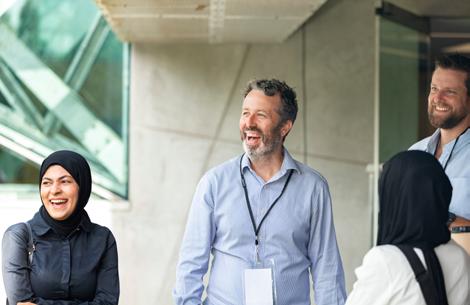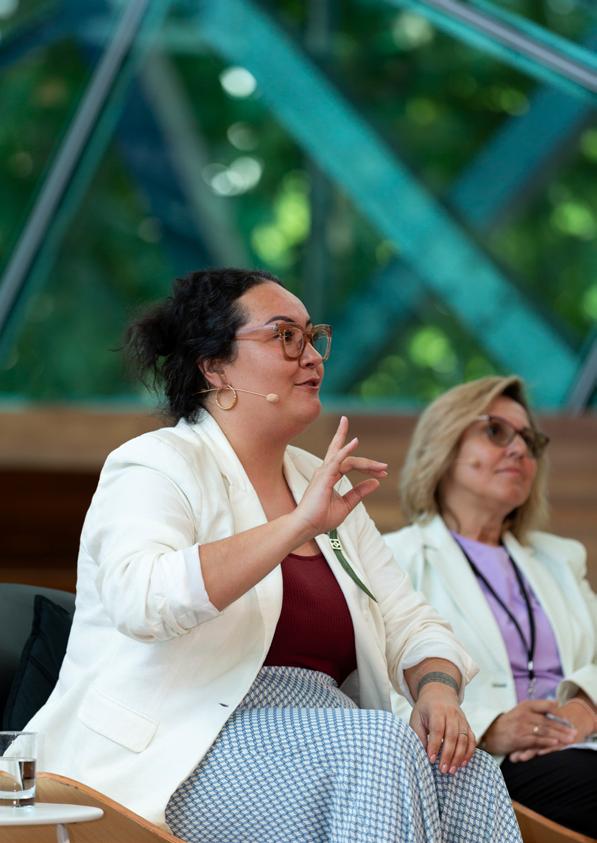
8 minute read
DISA Forum 2024 Recap
Understanding intersectionality in sport
Intersectionality is a term that’s used frequently but often misunderstood.
Put simply, intersectionality is way of looking at how people are represented and treated based on the different parts of their identity. The Diversity and Inclusion in Sport Alliance (DISA) Forum 2024 in Melbourne earlier this year set out to see how the concept can be used by sport.
The DISA Forum is an interactive event held in-person and streamed online where panellists with varied involvement in sport come together with sports administrators, volunteers and diversity and inclusion professionals to discuss ways to make sport more inclusive and accessible to everyone. For the 200+ in-person attendees and 600+ people tuning in online, it was a lesson in how to use the concept of intersectionality to make their sport more inclusive.
Intersectionality and community sport
When it comes to community sport, intersectionality plays a role in how a person accesses and takes part in sport. A child living in the outer suburbs with immigrant parents is going to have a different experience in sport than a child living in a high socio-economic, inner-city area, and additional identities like their race, gender expression, and language spoken at home will further shape that experience. The intersections of their identities means that they each will have their own barriers and enablers to participation, and each will have a unique experience of sport. Making intersectionality a part of your sporting organisation’s practice is recognising these barriers and working to reduce their effect on how inclusive, safe, and fair your sport is for those individuals.

Panellist and Executive Director of Helping Hoops Teuila Reid doesn’t use the word ‘intersectionality’ when explaining the concept to the coaches in the program at Dandenong. “The language I use is around focusing on the whole athlete. We coach the whole person, the whole child.”
“We never have that expectation that after knowing something for a week, you’re going to be the best at it. We know that it takes consistent application, discipline, the right people, the right situations, all of those things that ultimately can culminate in success and performance. It’s the same thing when thinking about a framework that we define as intersectionality today,” Ms Reid said.
For Ms Reid, practising intersectionality involves trial and error while we each figure out what it means to us, rather than getting a list of “five hacks to intersectionality” and having an inclusive and intersectional sporting organisation overnight.
DISA member and Play by the Rules National Manager Tom Dixon develops strategies that use the concept in his day-to-day work, but also has the experience of being a committee member at a local footy club and knows that it’s achievable to include intersectional approaches to how the club operates.
“The concept of intersectionality offers lots of opportunities for decision making at all levels of sport management to better reflect the diversity of Australia’s community, the diversity of experiences, and the barriers and discriminations faced by people – barriers that continue to deny people sporting opportunities to this day,” said Mr Dixon.
“For me, the 2024 DISA forum represented a great step forward in how the sport and recreation industry frames diversity and inclusion over the next decade. In my experience in sport, the topic of intersectionality is not widely used, so just having this concept explained and explored was really useful for me, and for people attending in person and online.”
Intersectionality and organisation leadership
Positive duty plays an important role in practicing intersectionality in sport. Panellist and internationally renowned human rights and gender equality activist Maria Dimopoulos AM noted the steps being taken to make intersectionality accessible to sport. A key action is through the Australian Sports Commission’s series of consultations into what an Intersectionality Framework in Sport would look like, and how it could help create culture change in sport governance and leadership to facilitate the inclusion we all want to see in our organisations.
Discrimination Commissioner Kate Jenkins’ Respect@Work national inquiry. “[The inquiry] recognised the significance of the fact that identities don’t operate in this singular way, ultimately the contribution of the positive duty aspect.”
“It turns our attention to the important role that leadership and boards play, and it provides us with a critical inquiry model that says, you not only need to be responsive to complaints, you need to be able to anticipate the potential of systems to oppress, to exclude, to invest power over some groups,” said Ms Dimopoulos.
A strength-based approach
Panellist and Paralympic Swimmer Ahmed Kelly shared that when it comes to intersectionality “it’s just about seeing the person… just look at the person and the ability they can do.”
“Like growing up, I didn’t think I was any different. I had no arms and no legs, but I honestly didn’t feel like it was any different to me, and I wanted to be able to join my friends and nothing was gonna hold me back; certainly not my arms and legs, that’s for sure,” said Mr Kelly.
“I remember the first time playing Aussie Rules footy. I’d been playing with my friends at school and it was the first time I thought, okay, I wanna take this serious and play for a local football team. My mum thought I was absolutely crazy, but I was just so passionate about it. I had an amazing coach as well… He was full of enthusiasm, and he was really accepting about everybody, which is fantastic. He didn’t see me as anyone different – that was probably what set the tone for every one of those athletes. He said, ‘Ahmed wants to join the group, everybody meet Ahmed, let’s play footy.’”
Watch the Forum in full: vimeo.com/playbytherules/disaforum24

The DISA Forum 2024
This year the Forum was hosted on 23 January by CMSport in partnership with Play by the Rules, Pride in Sport and Tennis Australia, with 10 speakers and moderators discussing the topic “what is intersectionality and how can sport use the concept?”
The host on the day was Beau Newell, National Program Manager at Pride in Sport, who is a champion of inclusion, an LGBTQ advocate with extensive experience in sports and a steadfast commitment to human rights.
The panel discussed topics at the forefront of the role intersectionality plays in sport, how we need to decolonise sport and break down access barriers for participants, and what results you see when you simply have a go.
Panellists
Maria Dimopoulos
A nationally and internationally recognised expert, specialising in intersectionality and inclusion. She has worked across all tiers of government, advocating for human rights and social justice informed policy responses.
Maria Pallotta-Chiarolli
A nationally and internationally recognised writer, researcher, lecturer and consultant in the issues of cultural diversity, gender diversity, sexual diversity, family diversity, HIV/AIDS, and social diversity in health and education, with a specific focus on adolescence and young people.
Teuila Reid
The Executive Director of Helping Hoops, a NFP which runs programs instilling community cohesion through the vehicle of basketball. Teuila has served community, family and sports-based groups throughout Naarm over the past 10 years.
Jessica Crofts
The Manager of Gender Equity at Sport and Recreation Victoria in Naarm, Jessica coordinates the Preventing Violence Through Sport Grants Program. She is an experienced trainer, researcher and project manager, with a PhD in sociology and gender studies.
Radmila Dyson
Adriving force for positive change within the Officer City Soccer Club, Radmila emerged as a passionate advocate for female inclusion in sports after participating in a Football Victoria leadership program.
Jacara Egan
A proud Muthi Muthi and Gunditjmara former athlete, Coach and Mental Health Social Worker, Jacara has a passion for educating and creating culturally safe environments so all First Nations young people and their families have access to all levels of sport and mental health care.
Ahmed Kelly
A three-time Paralympian who has overcome many obstacles in his life. Born in Baghdad with significant disabilities in all four limbs, humanitarian Moira Kelly and her charity brought Ahmed and his brother Emmanuel to Australia for medical procedures in the early 2000s, which led Ahmed to a passion and professional career in sports.
Shelley Ware (Moderator)
A proud Yankunytjatjara, Kokatha and Wirangu woman from Tandanya who currently lives in Naarm, Shelley is a highly regarded AFL media presenter and MC. She is also a teacher, author, curriculum writer and facilitator, passionate about embedding Aboriginal and Torres Strait Islander history and culture into the national curriculum.
Kate Jenkins AO
A leader who has led cultural reform and advanced diversity, inclusion and performance in Australian workplaces, sport, parliament, education and the security sector.
Watch the Forum in full: vimeo.com/playbytherules/disaforum24

